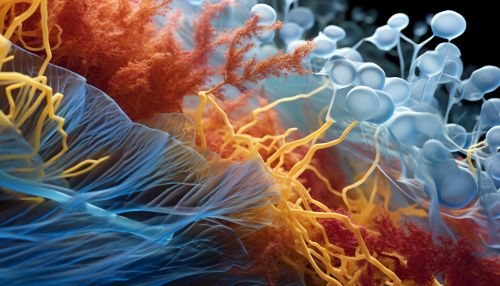Interferon
Introduction
Interferons (IFNs) are a group of signaling proteins produced and released by host cells in response to the presence of several pathogens, such as viruses, bacteria, parasites, and also tumor cells. They are named for their ability to "interfere" with viral replication within host cells. IFNs belong to the large class of proteins known as cytokines, molecules used for communication between cells to trigger the protective defenses of the immune system that help eradicate pathogens.


Classification
Interferons are classified into three types: Type I, II, and III. Each type is identified by the type of receptor through which they signal.
Type I Interferons
Type I interferons, the most abundant and widely studied type, include IFN-alpha (IFN-α), IFN-beta (IFN-β), IFN-epsilon (IFN-ε), IFN-kappa (IFN-κ), and IFN-omega (IFN-ω). These interferons are produced in response to viral infection by plasmacytoid dendritic cells (pDC) as well as by virus-infected cells. The type I interferons present in humans are IFN-α, IFN-β and IFN-ω.
Type II Interferons
The only Type II interferon is IFN gamma (IFN-γ). Unlike Type I IFNs that are produced by virally infected cells, IFN-γ is produced by natural killer (NK) cells, a type of cytotoxic lymphocyte, and by CD4 Th1 and CD8 cytotoxic T lymphocyte (CTL) effector T cells once antigen-specific immunity develops.
Type III Interferons
Type III interferons, also known as IFN lambdas (IFN-λ), include IFN-λ1, IFN-λ2, and IFN-λ3. They signal through a receptor complex that is distinct from those of Type I and Type II interferons. These interferons are important for defense against viruses, particularly at mucosal surfaces.
Function
Interferons have several functions. They have antiviral effects, modulate the immune system, and have antitumor effects. Interferons also influence every phase of the immune response.
Antiviral Effects
Interferons play a crucial role in the first line of defense against viral infections. They are produced in response to a viral infection and create an antiviral state in the cell to inhibit the replication of the virus. This is achieved by inducing the production of certain proteins, known as antiviral proteins, in the host cell.
Immune System Modulation
Interferons have immune-modulatory functions. They enhance the expression of major histocompatibility complex (MHC) components, which increases immune recognition of infected cells and tumor cells. They also enhance the cytotoxic activity of T lymphocytes and NK cells, and promote differentiation of B cells.
Antitumor Effects
Interferons have antitumor effects and have been used in the treatment of cancers. They inhibit the proliferation of cancer cells and can also stimulate immune cells, such as NK cells and T cells, which can destroy cancer cells.
Clinical Applications
Interferons have been used clinically for the treatment of a number of diseases. These include viral diseases such as hepatitis B and C, and cancers including leukemia, lymphoma and melanoma. They are also used in the treatment of autoimmune diseases such as multiple sclerosis.
Treatment of Viral Diseases
Interferons are used in the treatment of viral diseases due to their antiviral properties. They inhibit viral replication and also stimulate the immune system to destroy the virus-infected cells.
Treatment of Cancers
Interferons are used in the treatment of various cancers due to their antiproliferative and immune-stimulatory effects. They inhibit the growth of cancer cells and stimulate the immune system to destroy the cancer cells.
Treatment of Autoimmune Diseases
Interferons are used in the treatment of autoimmune diseases such as multiple sclerosis. They modulate the immune system and reduce the inflammatory response, which is often overactive in autoimmune diseases.
